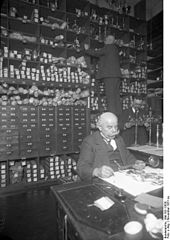Pawnbroker
![]()
This article is about the profession. For feature films of the same name, see The Pawnbroker (1964) and The Pawnbroker (1971).
![]()
This article or paragraph presents the situation in Germany. Help describe the situation in other countries.
The profession of the pawnbroker is based on the granting of loans of money against a lien on movable property (§ 1204 BGB). This lien, which is established by agreement and transfer of the pledged item to the pledgee, is also known as a Faust pledge. The conditions under which the commercial operation of a pawnshop is permitted are regulated differently by law in different states. Operating as a pawnbroker usually requires an official permit. His place of business is also known as a pawnshop, pawnshop, pawnshop or pawnshop. The Regensburg pawnshop, founded in 1650, is the oldest pawnshop in Germany.
The profession of pawnbroker
Requirements for the operation of a pawnshop
In order to open a pawnshop, the applicant must be able to demonstrate orderly financial circumstances and a trade licence in accordance with § 34 of the Trade, Commerce and Industry Regulation Act (Gewerbeordnung). The legal basis for operating a pawnshop is regulated in the Pawnbroker Ordinance (PfandlV). The applicant must apply for the trade at the responsible regulatory office and submit the necessary documents. In addition to an official certificate of good conduct, proof of the necessary means and an extract from the central business register, the applicant also needs insurance in accordance with § 8 PfandlV: "The pawnbroker must insure the pawn at least for twice the amount of the loan against fire damage, mains water damage, burglary and robbery".
In addition, in many municipalities the pawnbroker must provide evidence of high collateral, in the city of Cologne, for example, in the amount of 100,000 euros. A fee is charged for the issuance of the pawnbroker's permit; the amount varies from municipality to municipality.
Requirements for the granting of a pawn credit
The pawnbroker should appear in person at the pawnshop. An authorised representative requires a written power of attorney. According to § 6 PfandlV the pawnbroker has to issue a pawn ticket after receipt of the pawn. This contains information on the storage and realisation of the pawn, on the interest and costs of the pawn credit as well as the general terms and conditions of the pawnshop. Each pawn shall be marked with the number indicated on the pawn ticket. The pawnbroker must allow at least one month after the expiry of the loan due date to elapse before realising the unredeemed pawn elsewhere. Any surplus from the realization that is not collected by the pledger within two years shall be paid to the competent authority.

Pawnshop in Berlin (1931)
Services of a pawnbroker
The authorisation of the pawnbroker includes the granting of credit against the transfer of movable valuables. Certain securities (bearer instruments) can also be accepted as collateral. The borrower does not have to present further collateral or submit a credit report. To establish the necessary data, the pledger must identify himself with an official identification document. The pawnbroker loan is thus much less bureaucratic to obtain than a conventional installment loan. The pawnbroker then pays out part of the value in cash to the borrower. The lending rate is highest for vehicles, at around 80% of the value, while 25% to 50% of the value is usual for other items.
The pawn can be redeemed against payment of the amount borrowed plus the accrued interest and fees. For motor-driven vehicles, the Pawnbroker Ordinance also provides that a daily fee (known as demurrage) can be agreed for the storage, care and insurance of the vehicles. If the pledged items are not released, the pawnbroker is entitled to sell the movable items one month after the due date of the loan and is obliged to do so six months after the due date. As a rule, this takes the form of a public auction by a publicly appointed, sworn auctioneer. No maturity shorter than three months may be agreed.
An interest rate of a maximum of one percent per month or part thereof applies to the pawn credit (§ 10 PfandlV). In addition to the interest, monthly deposit fees are incurred, for which there are also maximum limits: For loan amounts up to €100, the ceilings are between €1 and €2.50 per month, with a further €1 per month for each additional €50 of loan amount or part thereof. For a 10-€-loan up to 1 € fees and 0.10 € interest are due per month, that is an effective annual interest rate of 132%. For a €100 loan, this means up to €2.50 in fees and €1 in interest per month, for an APR of 42%, and 38% for a €300 loan. For a loan amount of more than €300, the fees are subject to free agreement between the parties.
Search within the encyclopedia